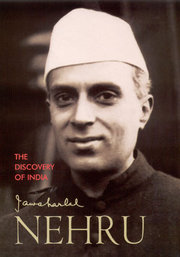
One of my memories of Doordarshan TV before private players were allowed into the Indian broadcasting arena was a program that I seldom watched, Bharat ek khoj! A TV adaptation of Nehru's "Discovery of India", I avoided it like the plague while my dad seemed to quite like it. So, naturally it took me a long time to pick up and read this novel. This surprisingly good read spans 550 pages and India's history as viewed by Nehru. My surprise stemmed part from reading what is essentially a politician's treatise and finding him showing his whole deck of cards. Sixty years and gazillions of dirty water under the bridge later, to read a politician reveal all his motivations without spin is a surprise.
The very fact that the author was Prime Minister for 17 years after independence makes this novel an important read. If you wish to understand why we did not become a developed country by adopting capitalism right away, this book can provide good answers. If you wish to understand why we did not end up becoming another Pakistan (a Hindu one), this book once again provides good answers. But most importantly, at many points in the text, you get the feeling that this book is more than Nehru. You get the inescapable feeling that he was talking for a generation of liberal policymakers who oversaw the transfer of a country and its destiny from His Majesty the Emperor of India to the common man and his representatives.
The book starts as a quasi-philosophical treatise written by a man in jail who compares his imprisonment and its debilitating effects on his psyche with that of India's occupation. To paraphrase him, his and India's ability to live in the present had been taken away by their imprisonment. To him, the impossibility of action meant the non-existence of the present. He refuses to be a prophet and talk much about the future. So he is left with the past. So the book continues with a historical analysis of India right from the pre Vedic times upto the Mughal and British period. All this leads into discussions of events then current, including the question of partition.
His stand on many issues including why India should be free, why the Quit India movement was launched and why partition is a wrong recipe are predictable. But what stands apart is Nehru's analysis of these issues and the way he conveys his conviction regarding each. I personally liked the history of the partition movement and how it started and thrived due to the differential rate at which the Hindus and Muslims adapted and interacted with the British and its educational system.
But the reason why I really liked the novel was that I could attempt to answer an age old question of mine. If I had lived in the early part of the previous century as a subject of the British empire in India, where would I have stood on issues facing the land. As a free Indian living today in an Anglophone country, my view of the British empire's legacy is murky at best. Especially given that I was born 33 years after and that today the sun never sets on the Indian call center regime servicing the former Empire and beyond makes it an even tougher question to answer. The circumstances couldn't be more different. The fact that I love British comedy and worship British rock doesn't make it any easier. Would I have lived a servile life or would I have taken up arms, actual or intellectual? I did not learn anything new from this text. I already knew about the massacres and the famines that India went through under the British. I already knew about the railway system and the civil service system that came about under the Raj. I also know that India, the crown jewel of the former Empire, is among the few former colonies that made it and did not go the way of former French colonies or Portuguese colonies. What Nehru and his novel helps one realize was that living in an imprisoned land was impossible to reconcile intellectually even for a moment. An objective analysis of the Empire's legacy using various statistics simply leaves out this intellectual component. There are certain things that one cannot be objective about, freedom being at the top of the spectrum. Though I still don't know the exact answer to my question on what i might have done, I do know that I would have been mighty pissed.

